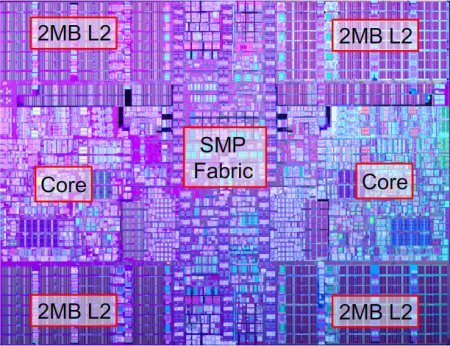Big Blue boasts of “fastest chip ever”
May 21, 2007 — by LinuxDevices Staff — from the LinuxDevices Archive — 1 viewsIBM claims to have doubled the performance (or halved the power requirements, depending on your point of view) of its top-end processor for servers and mid-range systems. The dual-core “Power6” processor clocks to 4.7GHz, has 8MB of L2 cache, and breaks four widely used Unix performance benchmarks, according to the company.
The Power6 chip will appear initially in “System p 570” systems with two to 16 cores. The p570 reportedly broke SPEC 2006 benchmark records for integer, floating-point, Java, and transaction-processing, marking “the first time a single system has owned all four categories,” IBM said.
IBM plans to roll out the Power6 processor in its “System p” and “System i” mid-range systems. These have traditionally run IBM's proprietary AIX version of UNIX, while also supporting multiple virtualized Linux servers running simultaneously alongside AIX.
The “thumbnail-sized” Power6 chip is built on 65-nm process technology, and integrates a generous 8MB of L2 cache, along with a pair of cores based on the Power6 architecture and connected by an SMP (symmetric multiprocessing) fabric.

Power6 die layout
Claimed Power6 features include:
- 300GBps processor bandwidth — claimed to be 30 times greater than Intel's Itanium
- First UNIX microprocessor able to calculate decimal floating point arithmetic in hardware
- Low-voltage operation, for processor blade applications, and high-voltage operation for SMP server operation
- Separate power supply “rails” for circuits that can't support low-voltage operation
- Voltage/frequency “slewing”
- Dynamic clocking
Additionally, the Power6 chip offers virtualization capabilities said to support live migration of virtual servers between physical hardware platforms without downtime.
Pricing and availability were not disclosed.
This article was originally published on LinuxDevices.com and has been donated to the open source community by QuinStreet Inc. Please visit LinuxToday.com for up-to-date news and articles about Linux and open source.